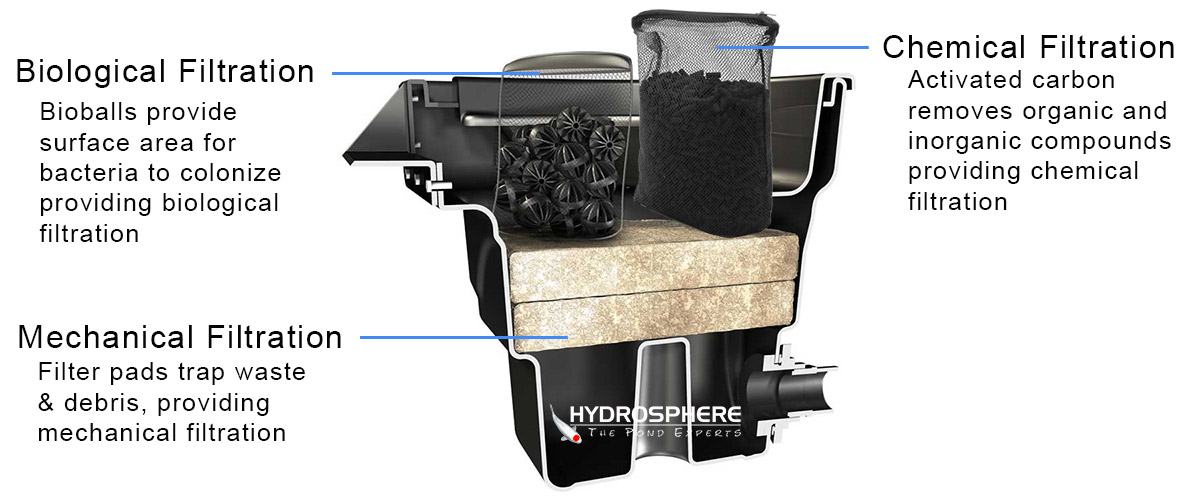Pond filtration is probably the most important aspect of pond keeping. Proper pond filtration is the key to maintaining clear, healthy pond water. There are three basic types of filtration processes that occur in pond, or aquarium filters – mechanical filtration, biological filtration, and chemical filtration. Each type plays a different, but important role in the overall health of your pond ecosystem. Inadequate pond filtration leads to poor water quality, and usually results in sick koi and goldfish.

Mechanical filtration is the most basic, and easiest type of filtration to understand. Mechanical filtration is the process of removing suspended particles such as fish waste, algae, leaves and other debris from the water. This is typically accomplished with the use of a porous filter media such as filter pads, open cell foam or even gravel to trap the debris.
A coarse filter media will only trap larger debris and let the fine particles pass through. Whereas a finer filter media will trap large and small particles and will clog much faster. Over time, the filter media will become more loaded with debris, and will eventually completely clog, forcing the water to push around the filter media.
Regular cleaning of the filter media will help to ensure the mechanical filtration is working properly and will help to maintain clean, clear pond water free from particles.
Using several layers of filter pads with different densities is a great way to provide effective mechanical filtration while reducing filter clogging and cleaning. This can be accomplished by using a coarse filter pad a the first step of the filter, then using successively finer filter pads after that, ending with the finest filter. With this arrangement, the larger debris will be trapped before it gets to the fine filter pad, preventing it from becoming clogged too fast.
Here are some different types of mechanical filter media: Filter Pads, Green Matala
If you have koi or goldfish in your pond, biological filtration is the most important aspect of filtration for providing a clean healthy environment. Biological filtration involves a process called the NITROGEN CYCLE, which relies on various beneficial bacteria to break down toxic waste products produced by fish and decaying plants, into less harmful substances. Simply explained, fish and decaying plants produce toxic AMMONIA, this is then converted by bacteria into less harmful NITRITES, and finally into mostly harmless NITRATES. Nitrates are then consumed by plants or algae in the pond.
Biological filtration depends on how many beneficial bacteria can live and grow in the filter to break down ammonia and nitrites. If there is more ‘room’ there in the filter, more bacteria can grow, and break down more waste. An efficient filter should contain a type of filter media that provides a large surface area on which the bacteria can grow. Since these bacteria flourish in clean, well oxygenated water, a filter should have an effective mechanical filtration stage to pre-filter the water keep biological filter media from clogging with debris.
It is true that some filter media (such as filter pads) have a large surface area, and can be used for mechanical filtration as well as biological filtration. But if you have to constantly clean the filter pads (with cold chlorinated water), this will also rinse away the beneficial bacteria and not allow the filter to mature properly. There are many well designed pond filters on the market that set up so the mechanical filter can be cleaned regularly without the need to clean the biological media.
Some of the best biological filter media includes: Bioballs, Moving Bed Filter Media(K1), High Density Matala Filter Media, and Hel-X 13 BioMedia
Chemical filtration removes organic and inorganic impurities from the water. The most common type of filter media used in ponds and aquariums for this is activated carbon or charcoal. Activated carbon removes these compounds from the water by the process of adsorption. Adsorption (not absorption) is the adhesion of molecules or compounds to the surface of something. Basically, these molecules stick to the surface of the filter media because of the charges of the particles. Carbon is a very effective chemical filter media because it is very porous, and is full of tiny pores. As water flows past the carbon, the organic molecules are attracted to the carbon and become trapped in its pores. For chemical filtration to work effectively, only clean water should be passed over the media so that it does not clog with waste from the pond. Carbon has a limited life span, once its pores are ‘packed’ with molecules, it can no longer trap any more and should be replaced as needed.
For most pond owners, carbon is commonly used to help clear dark, tea coloured water that is often caused by tree leaves falling into the pond in the autumn. It can also commonly used to remove odours, medications, ammonia and other wastes from the pond.
Most new pond hobbyists tend to under-size their pond filtration systems, which almost always results in needing to clean the filter very frequently, poor water quality, poor water clarity, and unhealthy fish.
To truly get the best filtration for your pond and have optimum water quality we recommend that you over-size your filter. Buy a filter that is bigger than recommended – you won’t be sorry that you did. A larger filter will provide more surface area for mechanical and biological filtration, will need cleaning less often and result in healthier fish.